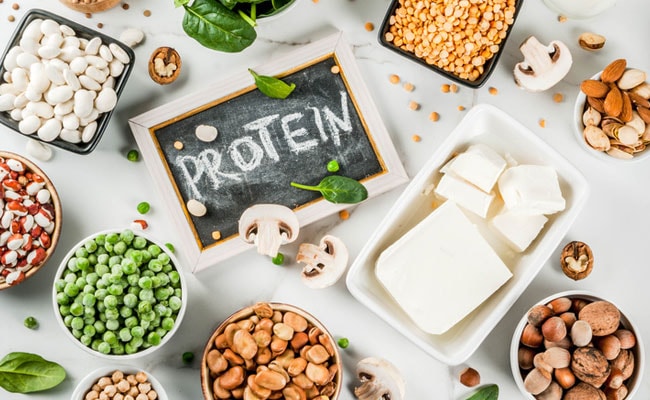Vegetarians often find it difficult to add protein to their diet. Read here to know 5 best food sources of vegetarian protein.
Need a Strong Nutrition Boost for Your Diet? Take a Look...

Dairy products like cheese and yogurt are excellent source of vegetarian protein
HIGHLIGHTS
- A slice of cheese is a great source of protein
- Go for protein rich soy foods like tofu and soybeans
- Grains like quinoa are high in protein
A nutritious diet is beneficial for the body and we must always be on the look out for one. Protein is a popular macro-nutrient, but unlike fats and carbohydrates, your body has got no reservoir for it. This macro-nutrient is extremely important for you. Protein is a key contributor for your blood, skin, bones, muscles and cartilage. However, it is a popular misconception that vegetarian foods are not good sources of protein. We are here to break this myth and talk about some popular vegetarian food sources of protein. Keep reading to know all about them.
Top 5 vegetarian sources of protein
1. Dairy: Your glass of milk should be your go-to source. It can provide around 8g of protein. Similarly, dairy products like yoghurt are great options too. A 100 gm yogurt consists of 3.4g of protein. On the other hand, a slice of cheese provides around 7g. These dairy products are rich in other nutrients like calcium and vitamin D as well.
Also read: Eat More Protein And 6 Other Tips That Can Help You Lose Weight Without Dieting
Need a Strong Nutrition Boost for Your Diet? Take a Look...
2. Nuts and seeds: Nuts and seeds are a versatile source you can add in your diet. They can be delicious and provide high protein to your body. Following is the amount of protein in 100 gms of the following nuts:
- Peanuts consist of 25.80 gm of protein.
- Almonds have got 21.15 gm of protein.
- Pistachios provide around 20.16 gm of protein.
- Addition of cashews can provide 18.22 gm of protein.
- Walnuts and hazelnuts provide around 14-16 gm of protein.
Protein rich seeds
- 100 gms of sunflower seeds: 5.8 gm of protein
- 100 gms of pumpkin seeds: 7 gm of protein
- 100 gms of sesame seeds: 5 gm of protein

Nuts are a good source of vegetarian protein
Photo Credit: iStock
Also read: Top 5 Proteins Bars That Can Be Made At Home For Weight Loss
3. Legumes and beans: From kidney beans to lentils, there are various types of beans and legumes you could opt for, to add protein to your diet. Here’s the protein content in 100 gms of the following beans:
- Chickpeas: 14.5 gms of protein
- Kidney beans: 13.4 gms of protein
- Peas: 8.2 gms of protein
- Lentils: 17.9 gms of protein
- Soybeans: 28.6 gms of protein
- Black beans: 15.2 gms of protein
- Peanuts: 25.80 gms of protein
4. Soy: Soy foods are loaded with protein. Even soy milk is a great vegan option for your protein needs.
- 100 gms tofu consists of 8 gms of protein
- 100 gms soybeans consist of 28.6 gms of protein
- Soymilk is also a rich source of protein
Also read: These 4 Mistakes On A Protein-Rich Diet Can Ruin Your Weight Loss Goals
5. Grains: From rice to millets, grains can also provide protein to your diet. Let us look at the various types of grains and their protein content:
- Amaranth – 14g of protein
- Oats – 16.9g of protein
- Quinoa – 14.1g of protein
- Buckwheat – 13.25g of protein
- Sorghum – 11.1g of protein
- Brown Rice – 2.6g of protein
- White Rice – 2.7g of protein
Disclaimer: This content including advice provides generic information only. It is in no way a substitute for qualified medical opinion. Always consult a specialist or your own doctor for more information. NDTV does not claim responsibility for this information.
DoctorNDTV is the one stop site for all your health needs providing the most credible health information,
health news and tips with expert advice on healthy living, diet plans, informative videos etc. You can get the most relevant and accurate info you need about health problems like
diabetes,
cancer,
pregnancy,
HIV and AIDS,
weight loss and many other lifestyle diseases. We have a panel of over 350 experts who help us develop content by giving their valuable inputs and bringing to us the latest in the world of healthcare.




